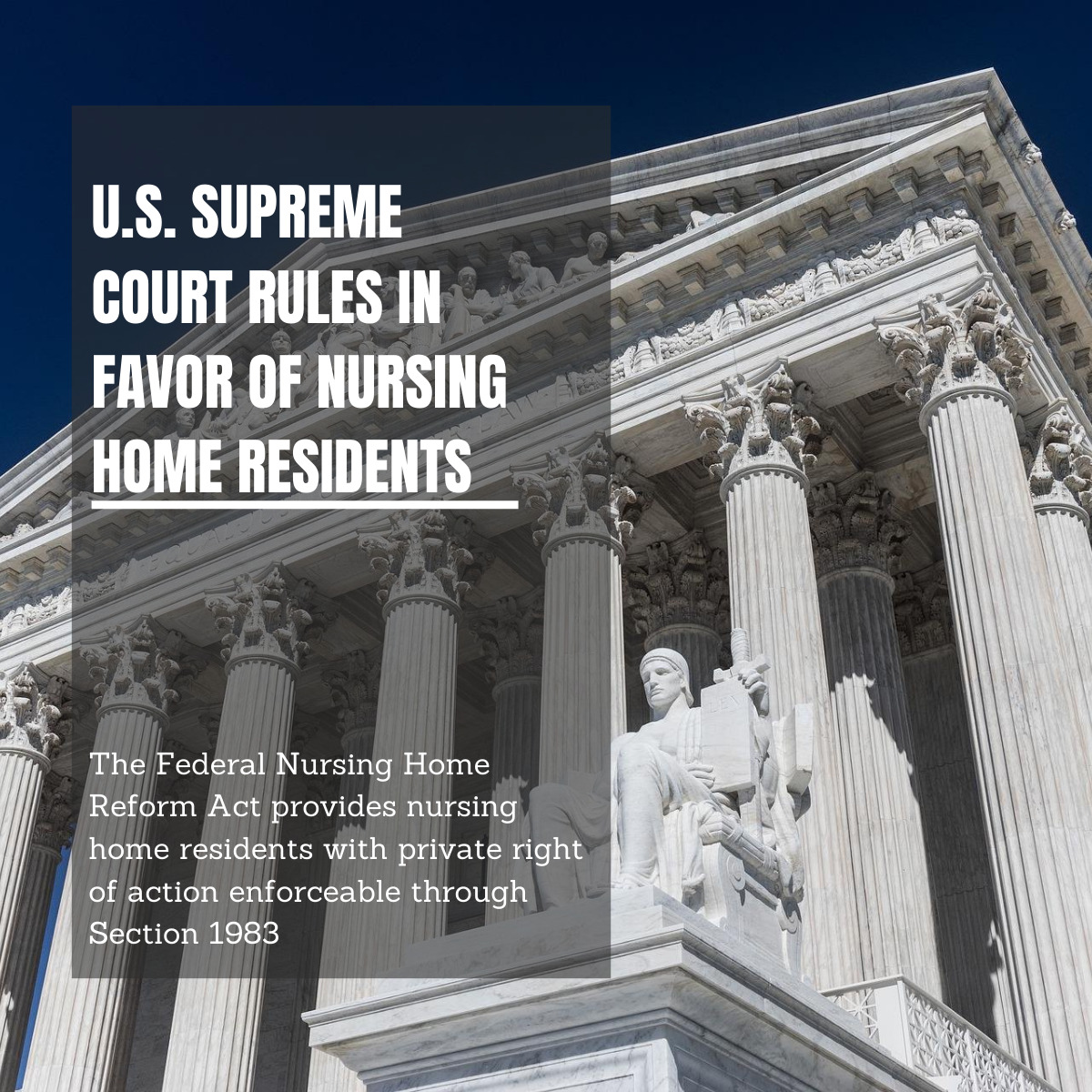Introduction:
In a landmark decision that impacts the rights of nursing home residents, on June 8, 2023, the United States Supreme Court rendered a significant ruling in the case of Health and Hospital Corporation of Marion County et al. v. Talevski. This legal battle sheds light on the importance of healthcare quality in nursing homes and addresses the question of whether the Federal Nursing Home Reform Act (FNHRA) confers a private right of action enforceable through Section 1983 of the Civil Rights Act. In this blog post, we will delve into the details of the case, explore the court’s ruling, and discuss its potential implications for the protection of nursing home residents’ rights.
Background of the Case:
The case of Health and Hospital Corporation of Marion County et al. v. Talevski revolves around alleged violations of the Federal Nursing Home Reform Act. Talevski, acting as the personal representative of a nursing home resident, filed a lawsuit against the Health and Hospital Corporation of Marion County and others, alleging that the nursing home failed to meet the statutory requirements of the FNHRA, resulting in harm to the resident. Specifically, Talevski alleged that he nursing home violated the provisions of the FNHRA that provide nursing home residents with the right to be free from unnecessary physical or chemical restraints and to be discharged or transferred only when certain preconditions are satisfied.
Key Legal Issues:
The central legal question before the Supreme Court was whether individuals could bring a private right of action under Section 1983 to enforce the provisions of the Federal Nursing Home Reform Act. Specifically, the court examined whether nursing home residents or their representatives could sue for damages when the nursing home failed to meet the required standards of care outlined in the FNHRA.
The Supreme Court’s Ruling:
In its ruling, the United States Supreme Court held that the Federal Nursing Home Reform Act does confer a private right of action that can be enforced through Section 1983. The Court emphasized that the FNHRA was enacted to protect the rights of nursing home residents and ensure a certain standard of care. By recognizing a private right of action, the Court empowers individuals to seek legal recourse and hold nursing homes accountable for violations of the FNHRA’s requirements.
The United States Supreme Court’s decision affirmed that the Federal Nursing Home Reform Act (FNHRA) provisions create rights that can be enforced through Section 1983 of the Civil Rights Act. The Court rejected arguments that private enforcement under Section 1983 was incompatible with the FNHRA’s remedial scheme.
The Court first addressed the historical context of Section 1983, noting that it has long provided a cause of action for individuals deprived of rights secured by the Constitution and laws. The Court rejected the argument that because the FNHRA was enacted based on the Spending Clause, it precluded private enforcement under Section 1983. The Court stated that the absence of displacement of established common-law principles and the nature of the cause of action created by Section 1983 as a tort claim did not support the argument.
The Court then examined whether the FNHRA provisions at issue unambiguously conferred individual federal rights enforceable under Section 1983. The Court applied the test set forth in Gonzaga University v. Doe, which requires determining whether Congress intended to create a federal right for the identified class of beneficiaries. The Court found that the unnecessary-restraint and predischarge-notice provisions of the FNHRA satisfied the test, as they were phrased in terms of the persons benefited and had an unmistakable focus on the benefited class.
Furthermore, the Court addressed whether Congress intended to preclude Section 1983 enforcement of the FNHRA rights. The Court found no evidence of congressional intent to preclude such enforcement, as the FNHRA lacked any express private judicial right of action or other provisions indicating preclusion. The Court emphasized that the FNHRA’s enforcement mechanisms did not show incompatibility with individual enforcement under Section 1983, as there was no distortion of the FNHRA’s statutory scheme or circumvention of presuit procedures.
In conclusion, the Supreme Court’s decision affirmed that the FNHRA confers a private right of action enforceable via Section 1983. This ruling has significant implications for the protection of nursing home residents’ rights and underscores the importance of accountability and quality of care in nursing homes.
Implications for Nursing Home Residents’ Rights:
The decision in Health and Hospital Corporation of Marion County et al. v. Talevski has significant implications for the protection of nursing home residents’ rights and the quality of care provided in these facilities. By recognizing a private right of action, the Supreme Court affirms the importance of holding nursing homes responsible for their actions or omissions that result in harm to residents.
This ruling may motivate nursing homes to prioritize the well-being and safety of their residents, as they can now face legal consequences for failing to meet the standards set forth in the FNHRA. Additionally, it provides a pathway for residents or their representatives to seek compensation for damages caused by negligence or inadequate care.
Conclusion:
The United States Supreme Court’s decision in Health and Hospital Corporation of Marion County et al. v. Talevski establishes a significant precedent in nursing home litigation. By recognizing the private right of action under Section 1983 to enforce the Federal Nursing Home Reform Act, the Court reinforces the importance of upholding healthcare quality and protecting the rights of nursing home residents. This ruling has the potential to enhance accountability within the nursing home industry and improve the overall well-being and safety of vulnerable residents. As this decision shapes the legal landscape, it is essential to monitor its impact and ensure the continued protection of nursing home residents’ rights.
Click here to view the full opinion.
